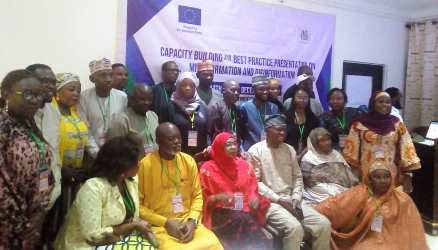By Justina Auta
Stakeholders have urged media practitioners to desist from publishing fake news, that could discredit the electoral process in the upcoming 2023 general elections.
They made the call at the sideline of a three- day capacity building workshop and best practice presentation on misinformation and disinformation on Friday in Abuja.
The workshop was organised by the Institute for Media and Society (IMS) under the component four (media support) of the EU-Support to Democratic Governance in Nigeria (EU-SDGN4).
Mrs Ladi Bala, President, National Association of Women Journalists (NAWOJ), urged Journalists to enhance their skills to enable them add value to the profession.
Bala said the training would enhance Journalists capacity to report the electoral process in an unbiased and accurate manner, void of misinformation and disinformation.
“You need to know how to leverage on the social media and equally do away with misinformation and disinformation.
“These days we pick things without verifying the sources of this information. We must not be purveyors of fake news and misinformation.
”We must be professional, thorough and change the narrative by making the media space more reliable and dependable,” she said.
Mr Akin Akingbulu, Executive Director, IMS said there was a need for the media to be responsible, identify fake news and fact-check any information before divulging it to the public.
“Misinformation and disinformation constitutes a deficit and danger to the electoral process.
“It could mislead voters in such a way that they may not be able to make informed choices in the electoral process.
“It could also trigger violence, as well as loss of confidence in the election management body,” he said.
Akingbulu urged journalists to understand the concept of misinformation and disinformation, as well as the electoral process ahead of the 2023 general election and beyond.
Mr Timothy Bamidele, Programme Manager, IMS, encouraged the media to publise more on the training and lessons learnt for national development.
Bamidele said that the training intends to engage the media with skills and tools to do fact-checking for any information.
Dr Suraj Adekunle, Mass Communication Department, Universal of Lagos urged the media to investigate and fact-check any news worthy report to verify its authenticity.
Speaking on fact-checking, Mr Kemi Busari, Editor, Dubawa, an independent verification and fact-checking project revealed some methodology that should be deployed to determine fact checking.
Busari listed methodology such as claim sourcing, researching, writing and editing to fact check any information.
He said that fact checking any information would aide in addressing misinformation, disinformation and fake news.


